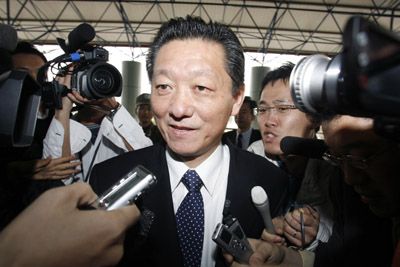China, DPRK diplomats prepare for new six-party talks
(Xinhua)Updated: 2007-03-09 17:17
Chinese Vice Foreign Minister Wu Dawei and Kim Kye-Gwan, top negotiator of the Democratic People's Republic of Korea (DPRK) to the six-party talks, met in Beijing Friday in preparation for the upcoming new round of six-party talks.
 North Korea's chief negotiator for the North Korea-Japan talks Song Il-ho (C) is surrounded by media as he arrives for departure at the Noi Bai airport in Hanoi March 9, 2007. [Reuters]  |
According to Wu, Kim briefed the Chinese side about his meeting with his US counterpart in New York early this week.
Wu also noted China hoped more progress would be made, and all relevant sides would make constructive efforts in this regard.
Five rounds of the six-party talks have been held on the Korean peninsula nuclear issue since 2003. The new round of talks is due to begin on March 19 in Beijing.
China has proposed a working group meeting on denuclearization be held on March 17, and is waiting for responses from the other five sides, according to Wu.
He suggested that before the opening of the sixth round of talks, three working groups meet on March 17 or 18. The other two working groups' meetings would be arranged by Russia and the Republic of Korea respectively in accordance with the agreement by the six parties, he said.
During the last round of talks, the six parties adopted a joint statement, and later reached consensus on the initial steps to implement the joint statement.
The steps included establishing five working groups on denuclearization on the Korean peninsula, the DPRK-U.S. relations, the DPRK-Japan relations, the economic and energy resources cooperation, and on peace and security of northeast Asia.
For the venue of the working groups meetings, Wu said it is up to the organizers to decide. He also said more multilateral consultations are needed to ensure the progress of the new round of talks.
During the talks last month, the five parties agreed to provide the DPRK with economic, energy and humanitarian aid equivalent to one million tons of heavy fuel oil in the near future.
China, ROK, the United States and Russia are the first countries that participated in the provision of aid.
"We hope, and also believe, that Japan could actively participate in the relevant process," Wu said, calling on the parties concerned to get over difficulties in bilateral ties and make constructive contribution to realizing the overall goal of the six-party talks.
Wu reaffirmed China's readiness to carry out its obligations on the issue.
"As one of the six parties to the talks, China has undertaken relevant duties and obligations, and we will earnestly implement them," he said.
Invited by DPRK, Director-General of the International Atomic Energy Agency (IAEA) Mohamed El Baradei will visit the country on March 13. "We believe it is an important step taken by DPRK and IAEA to improve their ties," Wu said.
China hopes the visit could help to realize the initial actions, he said.
The six-party talks on the Korean Peninsula nuclear issue involves China, the DPRK, the United States, the ROK, Japan, and Russia. It aims to to resolve the nuclear dispute on the Korean peninsula and safeguard the peace and stability in northeast Asia.
"Due to various factors including historical ones, a serious lack of trust between relevant countries has been the biggest problem for the six-party talks, making it difficult to take every step forward," said Wu.
He said China hopes that relevant countries can increase contacts and build up mutual trust via the platform of the six-party talks. "Once there is mutual trust, any big problems can be easily solved," he said.
On China's role in the six-party talks, Wu said China has been striving to help identify the junctures where the interests of six parties meet; on this basis the relevant parties will take concrete actions to carry out relevant commitments and enhance mutual trust to lay a more solid foundation for expansion of common interests and realize lasting peace in Northeast Asia.
"Due to their different national conditions, histories, cultural traditions and economic and social development levels, the six countries each have their own concerns in the talks, and the key to the success of the talks is the six parties can identify junctures where their interests meet," Wu said.
|
||
|
||
|
|